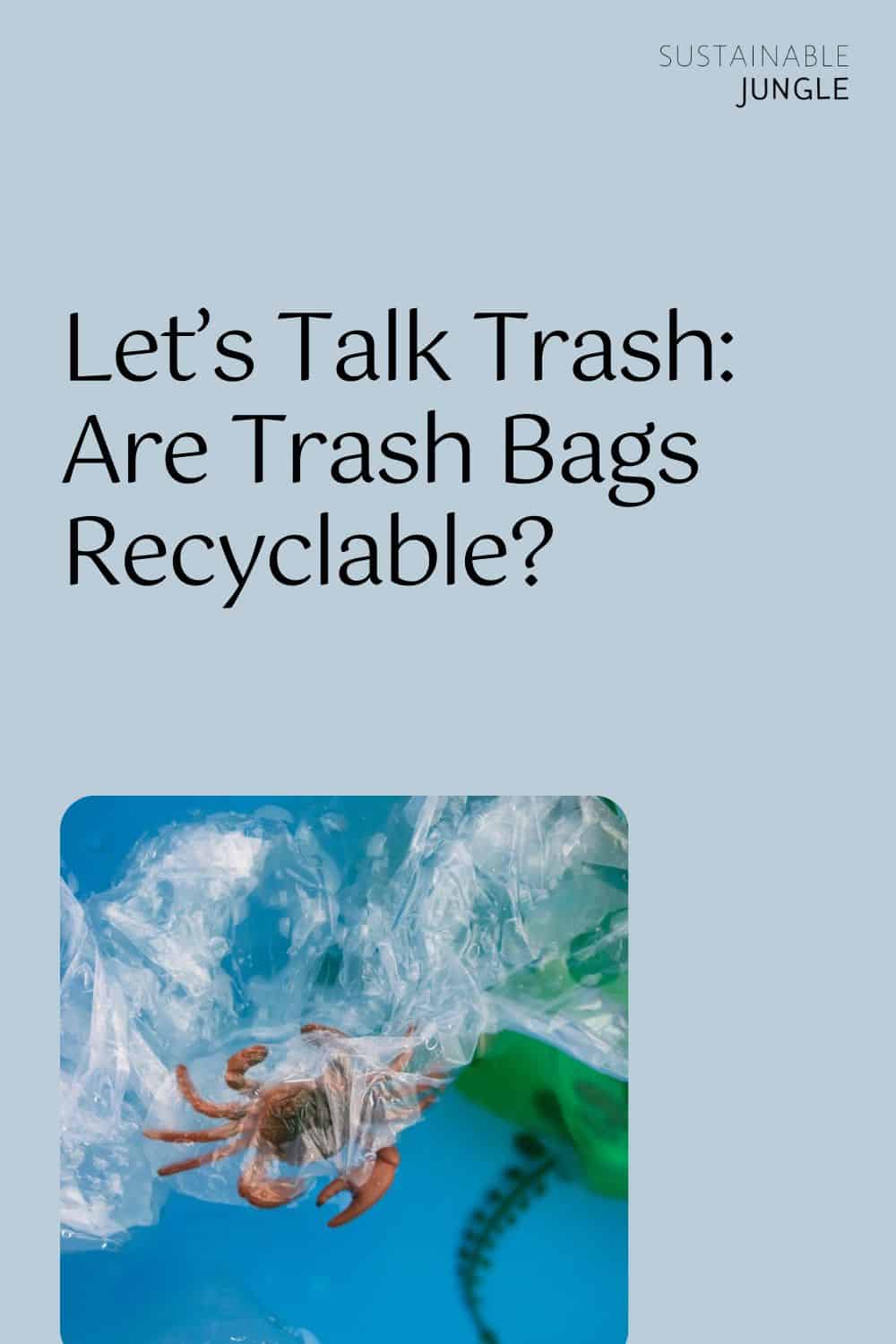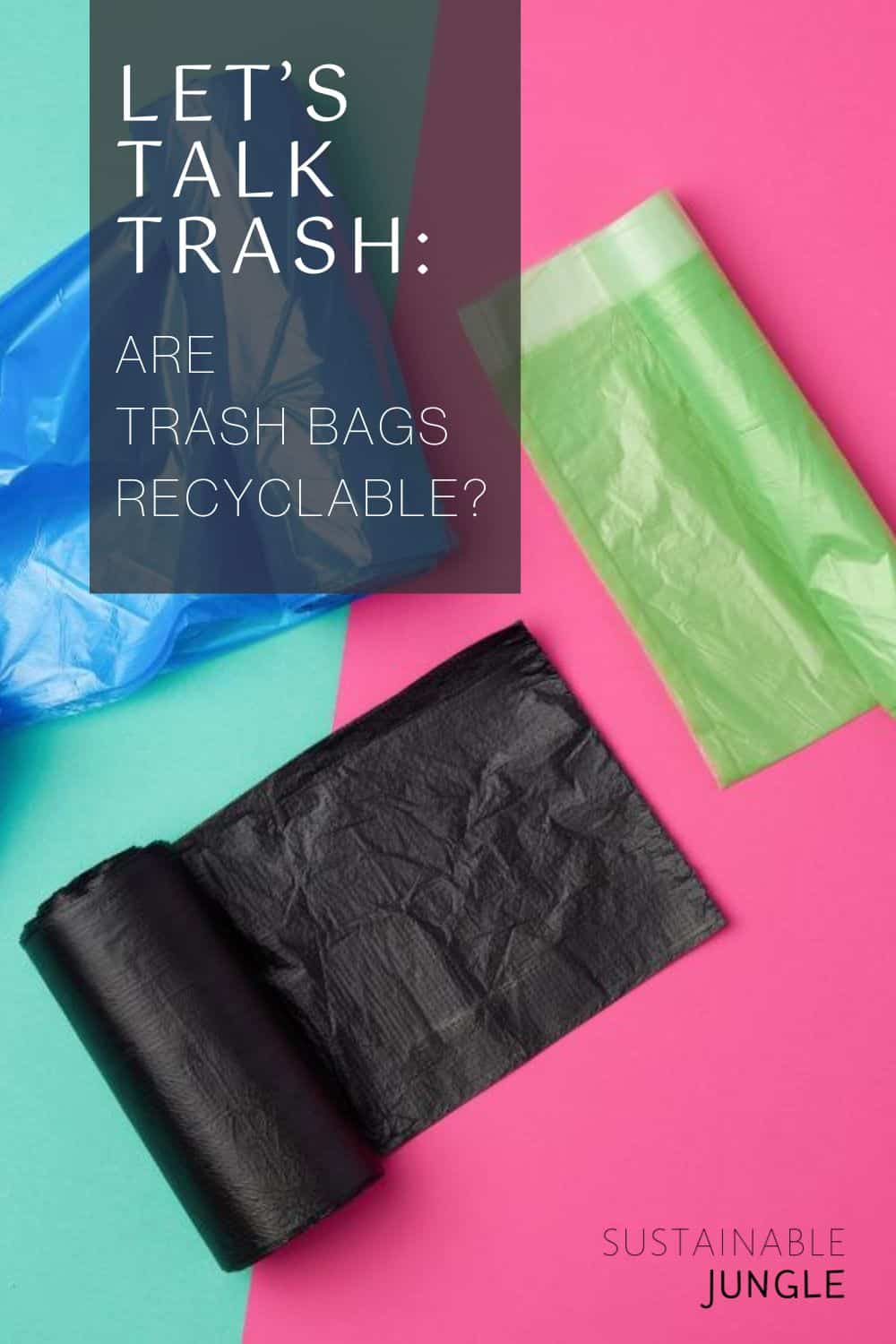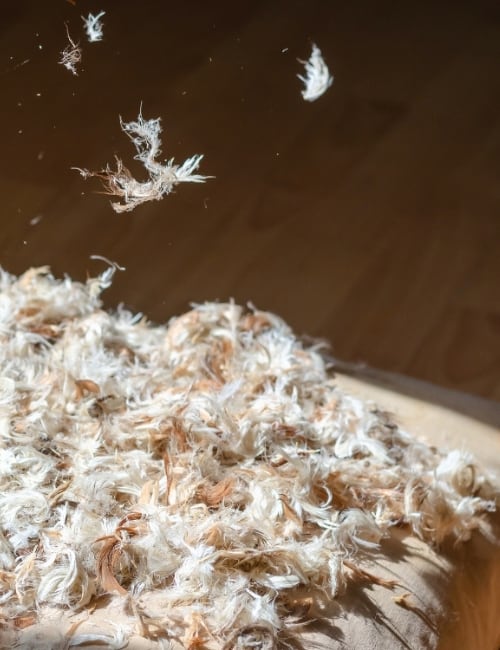
Are Trash Bags Recyclable? We Talk Trash & Garbage Disposal
Let’s begin by stating the obvious: trash bags are a literal pile of garbage.
As one of the most ubiquitous household items, plastic garbage bags are also one of the largest contributors to plastic waste on the face of this earth.
Even for those most dutifully dedicated to low waste living, perhaps the trickiest part of greenifying one’s home and waste reduction is the trash can.
After all, as human beings we inevitably create some amount of waste, and it isn’t the most sanitary or easy to handle without containment.
Though there are numerous reusable, recyclable, paper, biodegradable, and compostable options out there on the market now, this doesn’t automatically equate to a lessened carbon footprint or an overall greener solution.
As for your classic plastic garbage bag, most often they are made out of polyethylene, a petroleum-based resin that is preferred by manufacturers due to its heft, strength, and tear resistance. Not only is it derived from fossil fuels and incredibly energy intensive to make, it’s also estimated to take up to one thousand years for it to fully decompose.
At the very least, are trash bags recyclable? If so, how?
Let’s go through the latest findings about how trash bags can be recycled to determine the best foot forward out of the dumps and toward a more sustainable approach to waste management.
Can You Recycle Garbage Bags, Trash Bags, Plastic Bags, Or Any bags?
- Why is it important to know if you can recycle trash bags?
- What is a trash bag?
- Are plastic garbage bags recyclable?
- Which trash bags are recyclable (if any)?
- What about bioplastic or paper recycling bags?
- How to dispose of trash bags
- The future of recyclable trash bags
1. Why Is It Important To Know If You Can Recycle Trash Bags?
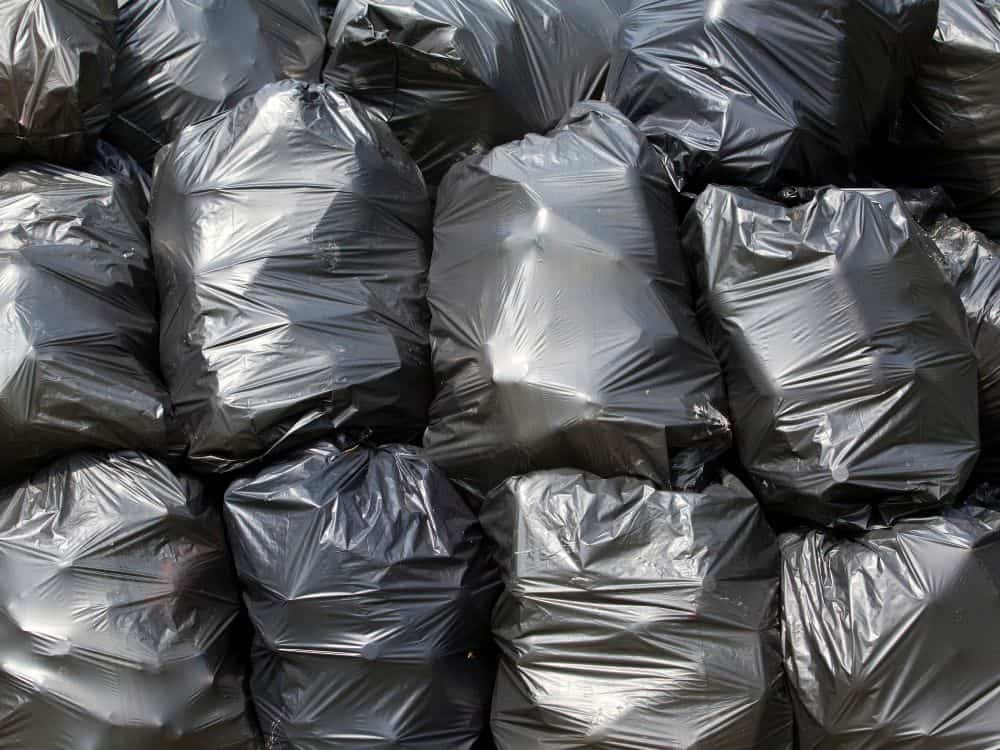
Plastic pollution is one of the most pressing environmental problems of our times.
While plastics have led to the invention of numerous life-saving devices and new technologies that arguably positively changed the course of human history, the advent of the throwaway trend it created presents us with plastic’s very dangerous side.
Almost half of all plastic ever made has been manufactured since the year 2000.
The amount of plastics being created increases every year, as the industry is propelled by oil and gas companies, who lobby to expand the plastics industry relentlessly.
England’s Royal Statistical Society named the fact that only 9% of all plastic ever made has likely been recycled as its statistic of the year in 2018—exacerbated by the fact that not all types of plastic are readily recyclable.
In fact, that’s one of the greatest inhibitors to recycling: recycling contamination. Worldwide, just 9% of plastic waste is actually recycled and 22% is mismanaged.
Instead, it ends up in landfills and oceans—more than 18 billion pounds of it in the latter each year. By 2050, plastic will outweigh all the fish in the sea.
Between that and the laundering of synthetic fabrics which make up over 60% of our wardrobe, microplastics have now been found in the Antarctic snow, countless marine animals (including those we eat), human placenta, and breast milk.
Scientists estimate humans now ingest more than 50,000 plastic particles per year.
Any positive news on the plastic front?
To quote marine biologist Sylvia Earle, “It is the worst of times but it is the best of times because we still have a chance.”
The Human Rights Watch recently declared plastic pollution a human rights crisis and have gathered for their first ever Global Plastics Treaty to carve a path forward through the overwhelming toxicity of plastics, towards a healthier planet for us all.
Until governments step up to create better mandates against plastic (and what goes inside the plastic), the burden of waste management still falls on the average household member.
2. What Is A Trash Bag?
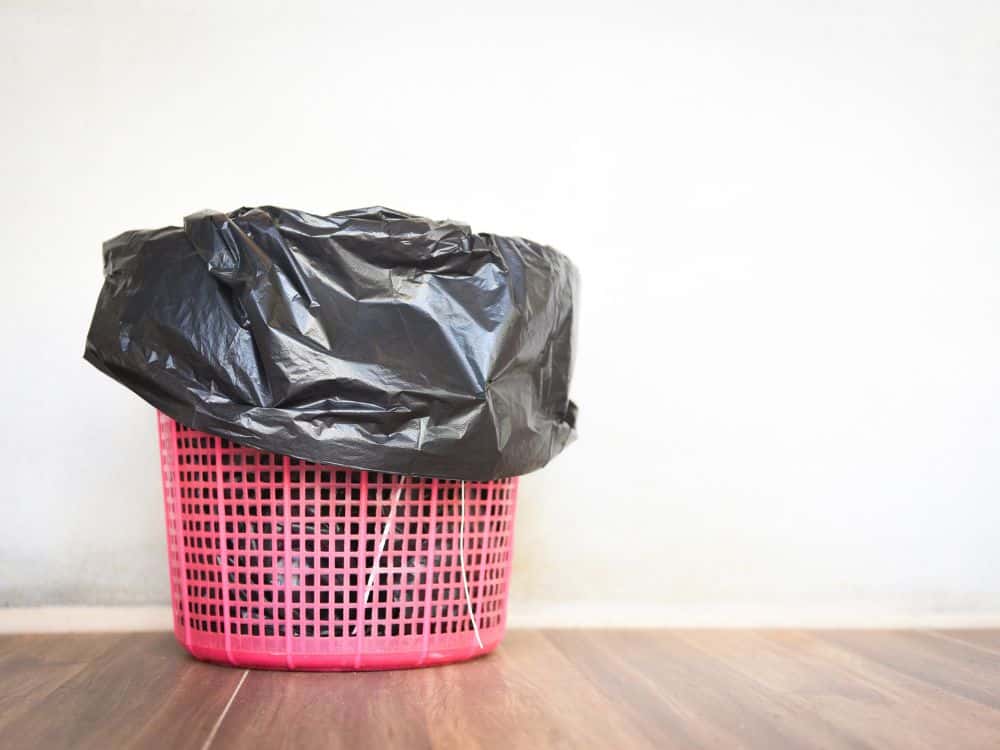
With all the concern over what we throw away, it’s important not to forget what we throw it away in.
The Cambridge Dictionary defines a trash bag as “a plastic bag put inside a bin to hold the waste and keep the container clean”.
They’re ubiquitous because they’re hygienic and practical, though their life cycle is anything but.
Ironically, the first ever plastic trash bag invention was never intended to create the plastics crisis we’re experiencing today. In fact, they were created to stop the need to cut more trees for paper bags.
Swedish engineer Sten Gustaf Thulin first invented the plastic bag for a company called Celloplast in the mid-1960s. It was meant to have a high load and last for multiple uses.
Nowadays, 100 billion single-use garbage bags or plastic grocery bags are used per year just in America alone—with global estimates around five trillion per year.
They come in all sizes and colors, but that actually lends to the difficulty in recycling bags. A pink garbage bag could never be melted down with, say, a black one. This is because the dyeing processes are totally different depending on the type or color of the plastic trash bag.
Which leads to the question: can you put garbage bags in the recycling at all?
3. Are Garbage Bags Recyclable?
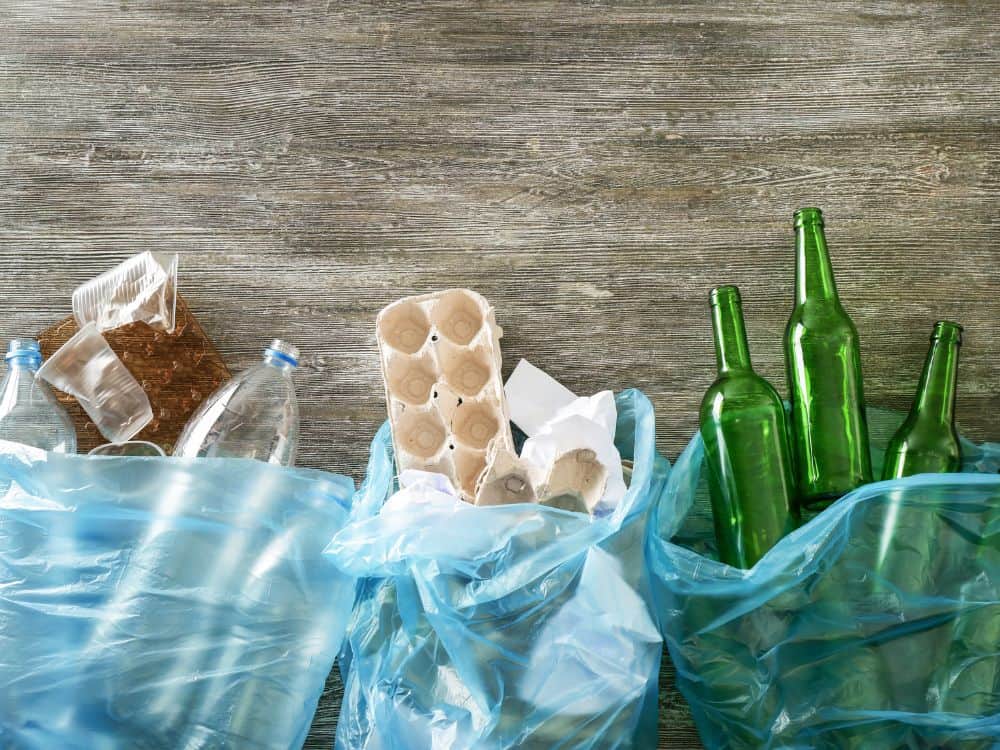
“Plastic recycling is a myth,” declared The Guardian.
Although, this isn’t entirely true. Plastics can and are recycled globally, even if the amount is dismal in comparison to the piles of it in landfills worldwide.
Recycling plastics is a controversial subject, as it is highly flammable, toxic, and dangerous. The Human Rights Watch recently released this harrowing report of the conditions of plastics recycling facilities in Turkey.
There’s even an online tracker to view current plastic recycling facility fires globally.
Plastic degrades with each time it is recycled, unlike glass or metal, which can be recycled an infinite amount of times without ever reducing their purity or quality.
On top of that, recycling plastic—especially soft plastics—is costly, hence why many recycling facilities refuse to recycle grocery bags and the like.
That said, depending on your local recycling management company, you can recycle plastic bags—as long as there aren’t any traces of trash or food waste inside.
Are blue plastic trash bags recyclable?
Then there is the question of clear blue recycling bags people use to line their recycling bin. They’re designed to collect recyclable goods, but can these plastic bags go in the recycling themselves?
Again, this is dependent on your municipal recycling facilities. For example, they are accepted in NYC and other major metropolitan areas but not in most small towns. Check with your recycling facilities to confirm what they’re capable of.
The worst part of these is that they can actually contradict their own purpose. If recycling is put into these bags, some recyclers automatically toss it in the landfill as they don’t have the time or resources to sort what’s inside.
In other instances, the contents are indeed recycled while the bags are tossed.
In the best case scenario, the blue plastic trash bag also gets melted down and repurposed, but these instances are overall rare.
4. Which Trash Bags Are Recyclable (If Any)?
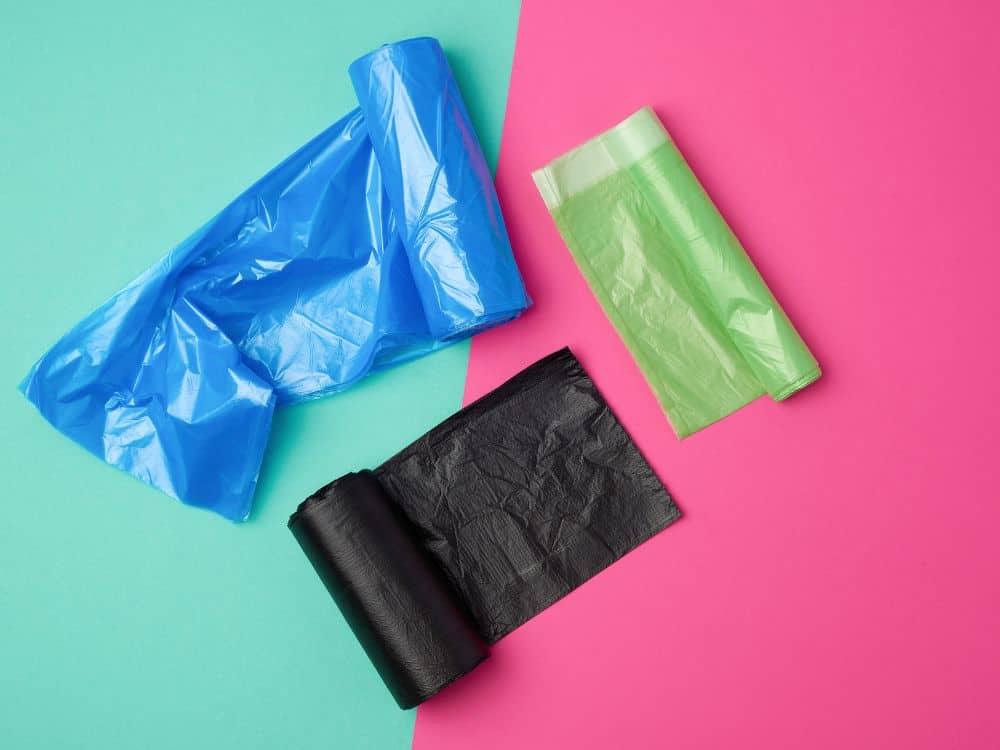
There are many different types and makers of garbage bags, but is their end-of-life fate different? Are there trash bags that can be recycled? And if so, what are these recyclable trash bags?
Let’s break it down by trash bag:
Can you recycle white trash bags?
White garbage bags are most commonly used in bathrooms, healthcare facilities, and kitchens.
If your local recycling agency allows for recycling bags, they will recycle these if they have a #2 or a #4 on them.
These are resin identification codes (RICs) that specify to recyclers what type of plastic it’s made of and where it can be recycled. A plastic or garbage bag will usually be #2 or #4.
Likewise, you can often take them to your local big box store, where it’s quite common nowadays to find a bin for plastic bag recycling, providing some form of answer for those wondering, “What can you do with old trash bags?”
There’s even a handy locator in the US for where to recycle plastic packaging wrap, clean plastic bags, and film—though whether the contents actually get recycled or if the presence of these bins is nothing more than greenwashing is another matter.
This is also the case for those wondering, “Can you recycle grocery bags?” as most (though not all) grocery bags fall into the white bag category.
Are black trash bags recyclable?
These bags are made black because they protect trash best from sunlight, which causes garbage to decompose faster and smell worse.
Black garbage bags are both the most ubiquitous and the hardest to recycle, as they are boiled down into black pellets and cannot be redyed into anything else, making the recycling process very specific.
While technically you can recycle garbage bags that are black, often they aren’t because the quality of plastic reduces after each life cycle, and oftentimes they are already made from a recycled plastic of some sort.
Moreover, recycling machinery tends to break from the attempt at recycling them.
Are Hefty trash bags recyclable?
Hefty has their own EnergyBag® Program to give communities a way to collect otherwise hard-to-recycle plastics at curbside.
But bear in mind, this is also the company that received a class-action lawsuit in 2021 for advertising bags “perfect for all your recycling needs” that themselves were not recyclable at all.
Are Glad trash bags recyclable?
Again, it’s up to the discretion of your local recycling for this one as well as what colors Glad bags you use.
If you’re using Glad blue recyclable bags in a neighborhood that doesn’t accept them, beware the recycling inside is most certainly landing in the landfill.
Are Kirkland plastic garbage bags recyclable?
Kirkland advertises that all their garbage bags are recyclable, but this is more of a greenwashing claim given that it’s not up to them if they’re recycled or not—it’s up to local recycling plants.
Are clear blue plastic bags recyclable?
For the most part, recycling plants and zero waste folks alike are begging people to stop placing their recyclables inside these bags because, as mentioned before, most facilities don’t recycle them.
5. What About Bioplastic Or Paper Bags?
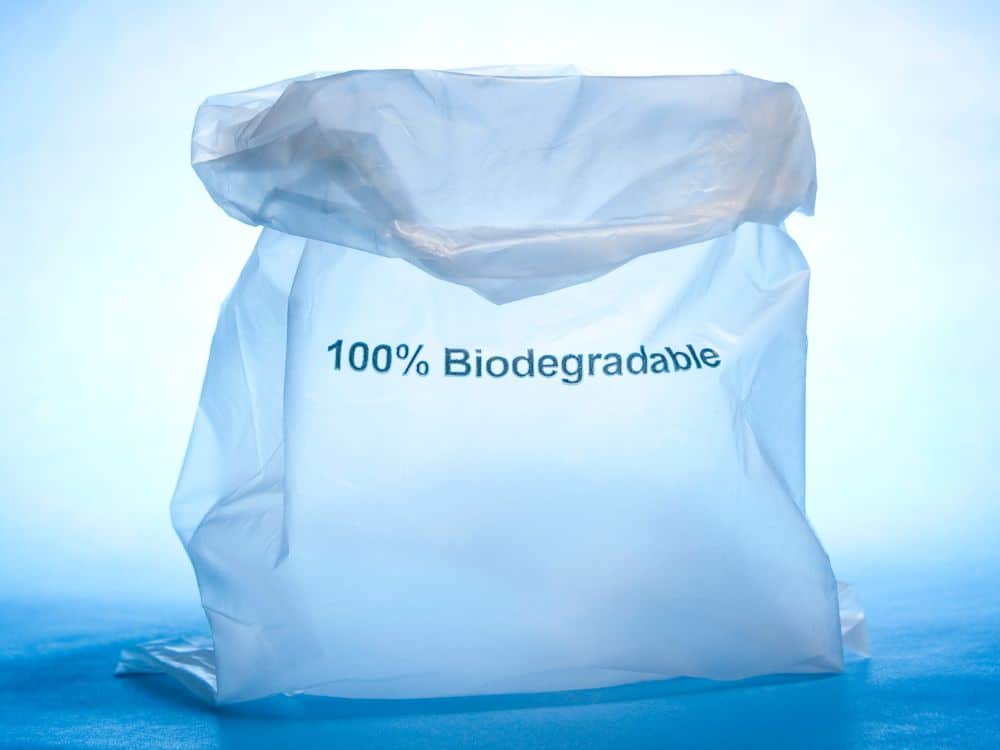
So, what about compostable and biodegradable trash bags? Are garbage bags biodegradable really, and if so, they a better solution?
We’re afraid not, at least not as far as being a direct replacement for recycling or trash bags.
Biodegradable trash bags
Biodegradable garbage bags are typically made from bioplastics. This means that instead of petroleum, these PLA (Polylactic Acid) bags are created from plants like corn starch, sugarcare, or cassava.
While a number of chemical processes occur to plasticize these materials, the end product is free of toxins like BPA and decomposes faster than your typical garbage bag.
Despite that, bioplastic bags are never recyclable nor are they the solution for landfills.
If left in landfills, they will release thousands of tiny microplastics over a long period of time. They also release methane gas, a greenhouse gas 25x more potent than carbon dioxide.
Compostable trash bags
While also never recyclable, compostable trash bags are a better option—but only if you’re actually composting with them, either at home or at a local composting facility with whom you’ve confirmed will accept them.
If compostable bags end up in a landfill, they also release large amounts of methane gas due to their reaction with the toxicity of the landfill.
Paper trash bags
Paper bags aren’t as environmentally friendly as we’re led to believe. Deforestation is a major contributor to climate change and loss of biodiversity.
Then there is the amount of energy required to create a paper bag. It takes four times the amount of energy and water to create a paper bag than a plastic one.
Due to their weight, the energy used to ship them means the carbon footprint of a paper garbage bag isn’t as green a solution as we’d hoped.
Plus, research shows that paper in landfills doesn’t break down quicker than plastic.
They’re not good options for recyclables except mixed paper either. This is because if a paper bag gets stained with food or grease of any kind, it’s instantly no longer recyclable.
6. How To Dispose Of Trash Bags
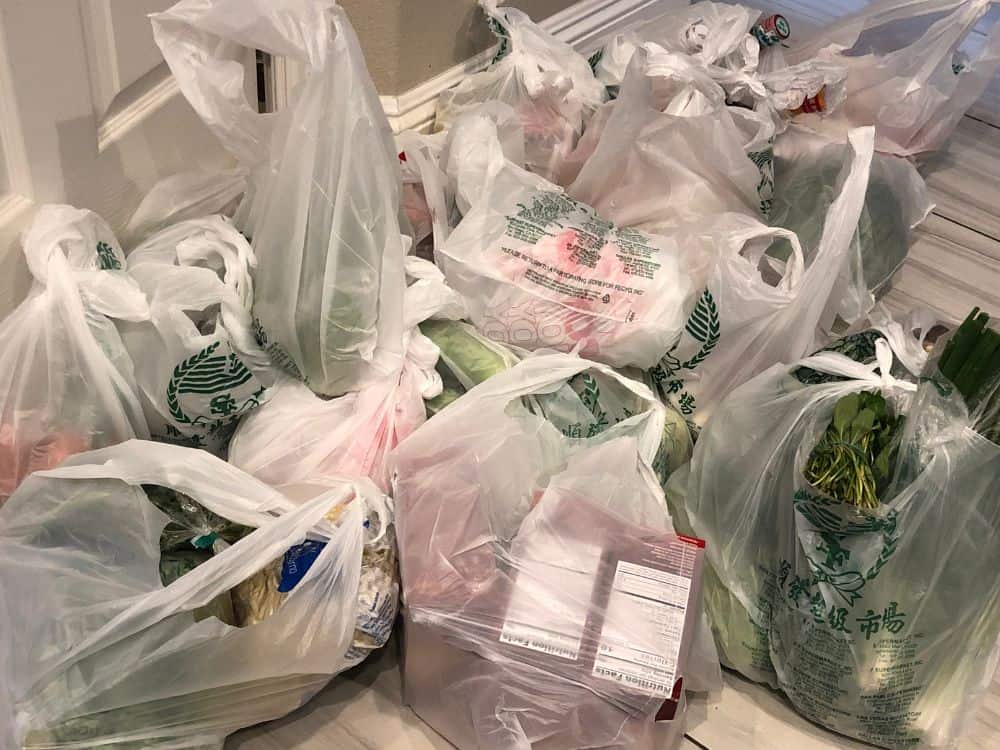
It can feel like a losing battle when it comes to sustainable solutions for the trash.
Compostable and biodegradable bags won’t work for the landfill due to methane gas, and plastic trash bags only contribute to our global plastics crisis.
Unfortunately, humans have yet to develop a long term, meaningful solution to waste.
That’s not to say there aren’t innovative and exciting possibilities—like genetically-developed plastic consuming worms and The Ocean Cleanup’s technologies to minimize the Great Pacific Garbage Patch.
The best option is to ditch the garbage bag altogether, therefore putting to rest all concerns about recycling bags period.
If you have trash and aren’t ready to go bagless (which requires a little extra yuck-work), you’re going to need a trash bag, plain and simple, but you can choose better options.
The best options are to repurpose old bags or boxes, or use recycled trash bags, like those from Seventh Generation.
Recycled trash bags are still plastic, but at least it’s giving already downcycled plastic another use before its inevitable fate.
Similarly, you can give those old grocery bags you accidentally got after forgetting your reusable ones at home a second life by using them as liners for small wastebaskets.
For recycling needs, utilize the blue recycling bin that many curbside programs provide for free, or sort your own recycling into an upcycled recycling bin or some boxes if you don’t have curbside recycling services.
For organic and compostable waste, invest in an indoor compost bin and some compostable bags.
What other sustainable measures can you take?
First refuse, reduce, reuse, rot (AKA compost), and lastly recycle in that order for the best measures—in that order.
By consciously cutting down on waste at home, you’re already making huge strides toward a healthier, more sustainable life for yourself and the planet.
But we know that some waste is, realistically speaking, unavoidable. We don’t all lead lifestyles that allow us to fit a year’s worth of trash into a mason jar—and mad respect to those who do.
Therefore, the best way forward is developing a green home waste routine where you:
- Separate your trash and recyclables properly in a recycling bin.
- Reduce the need for single-use items.
- Compost all organic matter.
- Recycle according to your local mandates (please don’t “wishcycle” and contaminate the whole recycling stream!).
- Reuse and recycle plastic bags or use recycled plastic bags for trash that must go to the landfill.
The EPA has this useful guide for home waste management in the US.
7. The Future Of Recyclable Trash Bags
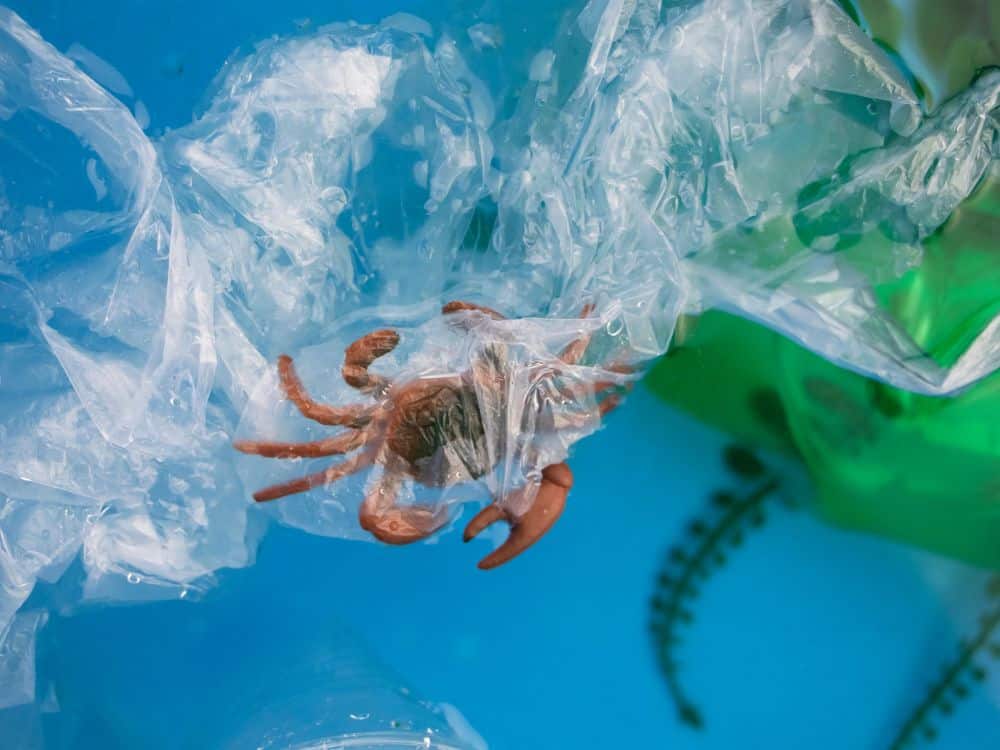
The UN’s recent assembly in Uruguay is attempting to develop a framework for the world’s Global Plastics Treaty, to protect human health, rights, and the environment from further plastics pollution.
This is necessary, given that production of plastics is expected to triple by 2060. This is thanks-no-thanks to the world’s largest oil and gas companies who drive the plastic industry, along with consumer goods companies.
As our creation of waste (and plastic) steadily increases, our waste stream management systems have not been able to keep up.
Garbage bags, if uncontaminated by waste or food, are technically recyclable, but how we use and discard them can make them tricky to recycle.
And while it will take another few years to hammer out and implement the Global Plastics Treaty with governments held accountable, it’s a positive step.
Ideally, it will end the production of all unnecessary virgin plastics, plus demand transparency about chemical additives in plastics. It will also protect the rights to health, water, food, and a healthy environment, especially for at-risk populations affected by plastics pollution.
Perhaps language is likewise what we need to shift our thinking. “We don’t call it waste, we call it materials,” says Green Recycling UK’s Jamie Smith.
Did you know we Have a Newsletter?
We cover the latest in sustainable living, fashion, zero waste, beauty, travel, finance and more…
Final Thoughts On Recycling Trash Bags
It’s no secret the world is drowning in plastic, but don’t get down in the dump.
We don’t spew facts to cause despair, but to help determine the best path forward to cleaner trash cans and recycling bins.
And it is time to take action. We consumers have purchasing power and therefore the power to pressure companies to stop lining store shelves with single-use plastic items to line our trash cans.
As the philosophy of zero waste tells us, refuse, reduce, reuse, and rot—only recycle when the first three aren’t possible.
If you’ve enjoyed talking trash with us, please share this article with eco-minded friends and family who we know have at least once pondered the question: can you recycle plastic trash bags?
Pin these:
